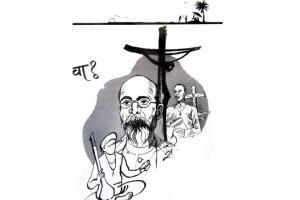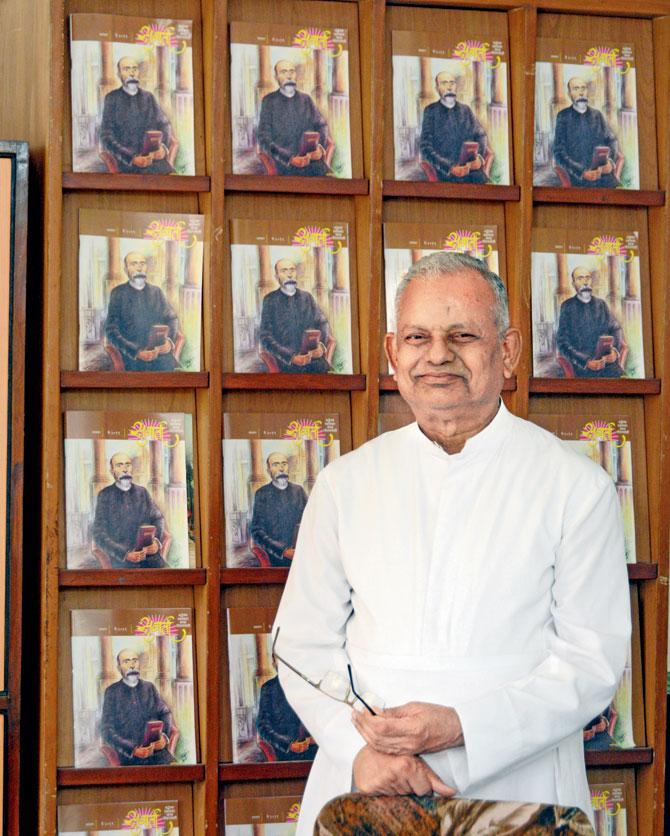Narayan Waman Tilak, the Hindu Brahmin poet-reformer who converted to Christianity in 1895 in a Bhendi Bazaar chapel, is remembered by Mumbai's intelligentsia for his open-ended porous definition of religious faith

Suvarta's tribute to the legendary poet. Pics/Satej Shinde
 Pack up your bags and leave, if you do not like Hind bhoomi!" This line is not an election-themed hate speech or a pro-Hindutva rally rhetoric. It is the English rendering of an excerpt from a Marathi abhang (a poetic meter associated with songs sung in praise of Lord Vitthal) penned by poet-editor-thinker Reverend Narayan Waman Tilak in praise of Jesus Christ over a century ago. Tilak, a controversial figure who turned to Christianity in 1895, contributed his abhangs to the Dnyanodaya weekly periodical around 1916. His verse did not follow a thematic order; he locked his thoughts in rhythmic patterns, elaborating on his reasons for taking recourse to Christianity, search for a fair and universal religious order, the metaphysical experience of meeting his Lord and most importantly, exploration of the role of faith in an ephemeral human life. He opposed orthodoxy and rigidity of every form and shape, counting the inconsistencies in his discarded (Hinduism) as well as chosen religion. Even as he dared the British missionaries, he fervently appealed to them not to propagate narrowness and sectarianism in the name of Christianity. He had a strong dislike for people who chanted Christ's name as a matter of outward accommodation but did not espouse his compassion — "Navhe Kristi Kristi Pari Krist Krist/ Jag He Santapt Jap Kari!"
Pack up your bags and leave, if you do not like Hind bhoomi!" This line is not an election-themed hate speech or a pro-Hindutva rally rhetoric. It is the English rendering of an excerpt from a Marathi abhang (a poetic meter associated with songs sung in praise of Lord Vitthal) penned by poet-editor-thinker Reverend Narayan Waman Tilak in praise of Jesus Christ over a century ago. Tilak, a controversial figure who turned to Christianity in 1895, contributed his abhangs to the Dnyanodaya weekly periodical around 1916. His verse did not follow a thematic order; he locked his thoughts in rhythmic patterns, elaborating on his reasons for taking recourse to Christianity, search for a fair and universal religious order, the metaphysical experience of meeting his Lord and most importantly, exploration of the role of faith in an ephemeral human life. He opposed orthodoxy and rigidity of every form and shape, counting the inconsistencies in his discarded (Hinduism) as well as chosen religion. Even as he dared the British missionaries, he fervently appealed to them not to propagate narrowness and sectarianism in the name of Christianity. He had a strong dislike for people who chanted Christ's name as a matter of outward accommodation but did not espouse his compassion — "Navhe Kristi Kristi Pari Krist Krist/ Jag He Santapt Jap Kari!"
ADVERTISEMENT

Father Francis Correa has devoted a special issue of Suvarta magazine to Reverend Tilak
Reverend Tilak's devotional idiom, which was first published in August 1919, a few months after he died at Mumbai's JJ Hospital, is now released in an annotated edition in his death centenary year, titled Abhanganjali (Swarang Nirmiti, R200, 122 pages). It recapitulates his biographical journey (1861-1919) for those unexposed to his momentous transitions, particularly his early life in a Chitpavan Brahmin Marathi family, marriage to a much-younger (12) Lakshmi and his final revolt against a caste-based patriarchal system which ill-treated his mother and sister.
The fresh edition succeeds in reviving a tall thought leader, hailed as the Wordsworth of Maharashtra and Tagore of Western India. There is a personal family story behind the making of the edition. Its editor, Dr Anupama Uzgare, is the grand daughter-in-law of Reverend Bhaskar Krishna Uzgare, the close disciple-admirer of Reverend Tilak who first published the abhangs 100 years ago. "For me, Abhanganjali is a coming full-circle moment; it is my family and community responsibility to bring the rich verse to life for the new reader who does not necessarily know of a daring and talented writer who was not even a matriculate." While Tilak's formal learning was terminated due to family compulsions, his mastery over Sanskrit, Marathi and English leaves academics aghast even today.

Dr Anupama Uzgare seen with the fresh edition of Reverend Tilak's Abhanganjali. Pic/Sammer Markande
Although Reverend Tilak is sensationalised and recalled in the context of his religious conversion, his identity had several social dimensions. Though difficult to deal with as a husband, he was a strong feminist in an age when Brahmin men were super-entitled and privileged in domestic and public settings. He lent himself to varied causes, ranging from plague-struck patients to drought-hit children with whom he shared his home. As his wife recalls in her iconic memoir, Smritichitre, he invited practically everybody home, without probing into the credentials of the guest. Once, when a thief broke into their house, Tilak reportedly felt relieved about not having to invest in a lock!
Little wonder that the poet, who kept his mind and doors open to influences, is being remembered by a range of people and institutions at Mumbai's Wilson College later this month. The day-long symposium on Reverend Tilak, in the presence of Bishop Prakash Patole and Arch Bishop Felix Machado, involves the Heras Institute of Indian History and Culture, The Church History Association of India and St Xavier's College. Those who have done their PhD theses on Reverend Tilak —Dr Malcolm Nazareth, Dr Tony George and Dr Anupama Uzgare — will speak on his literary accomplishments, particularly his choice of Saint Tukaram's literary vehicle for expressing belief in Christ. A choir will render some of Tilak's popular abhangs like "Shraddha Mazhi Avichal Tuzvar Sakal Sukhacha Tu Datar..."
Dr MD David, former head of history department at Wilson College and one of the key organisers of the Tilak death centenary event, feels that the bridges built by the Reverend are serviceable even today. "Not only did he bring together the Hindus and Christians (by following Saint Tukaram's devotional idiom) but he has also united Christians of all kinds — Protestant, Catholic, and Methodist etc — a true embodiment of ecumenism."
There are several theories about why the Reverend chose the erstwhile Bombay for his baptism. Scholars maintain that strong social pressure was building against him in mofussil Maharashtra (especially cities like Nasik, Ahmednagar and Nagpur where he had lived, worked and practiced as a pastor) due to which he came to Mumbai and around (he stayed with the Karmarkars in Vasai after the rites). But many feel that Tilak had not hurried his baptism out of any fear; instead he publicised it first in Dnyanodaya weekly and then specifically chose former untouchable Reverend Tukaram Nathoji (editor of the weekly) for his induction. He did not want a foreigner, nor a former upper class Hindu to do the honors; the American Marathi Mission's Bhendi Bazaaar chapel, which exists no longer, was vital in realising his plans. "Whenever I think of his association with Mumbai, I feel so lucky that my city became the backdrop for his symbolic gesture of embracing Christianity, but not as a colonised subject!" says the Vasai-based Father Francis Correa, who is part of the Tilak death centenary initiative.
In this day and age, when religious conversions are perceived anti-national political acts, more than a matter of personal faith, Tilak in the pre-Independence past demonstrated a strong nationalist streak while espousing a new belief system. In fact, the May issue of the diocesan monthly Suvarta magazine, that Farther Correa edits, pays special tribute to Reverend Tilak's open-ended porous definition of religion. In Marathi, Suvarta means good news; this definitely is.
Sumedha Raikar-Mhatre is a culture columnist in search of the sub-text. You can reach her at sumedha.raikar@gmail.com
Catch up on all the latest Crime, National, International and Hatke news here. Also download the new mid-day Android and iOS apps to get latest updates
 Subscribe today by clicking the link and stay updated with the latest news!" Click here!
Subscribe today by clicking the link and stay updated with the latest news!" Click here!






